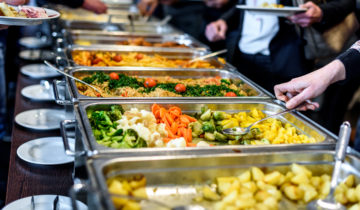The long period of social isolation caused by COVID gave rise to new habits (a boom in home-made food and in click & collect and food delivery services). Consumers have become more demanding, they have stopped being willing to accept limitations and pay more attention to prices.
Within this context, snack food options can meet diners’ expectations of convenience thanks to solutions that enhance their daily lives. “Ready to eat” food is a good way to reconcile limitations with aspirations, as it combines better time control for catering services with consumers’ desire for “fast good” in their institutional canteens.
Snack food is no longer restricted to teens who want to eat burgers, pizza or kebabs. Alongside their traditional self-service offerings involving a meal tray featuring a starter, a main course and a dessert, many canteens have come up with alternative models.
Snack food: Readily available at companies
According to GIRA Foodservice, the working world is the sector that has been the most profoundly affected by post-pandemic changes, in respect of both demand (varying on-site presence in the workplace, adaptability of workplaces and workspaces, business travel, new expectations in terms of services, availability, transparency regarding product sources and quality, CSR commitments, etc.) and supply (flexibility, product quality, use of short supply channels, adaptability, expanded mealtimes, etc.).
Staff canteens meet both their primary function of feeding employees as well as a secondary function of supporting them through their workdays by providing services, improving companies’ appeal as employers and more generally contributing to workplace wellness.
Many institutional catering groups have rolled out new concepts:
- 2022 rollout of “Re-Set!” at Elior: according to Frédéric Galliath, CEO of Elior B&I, “Elior has developed new catering solutions that are more flexible in terms of time and space. Elior now offers companies new forms of catering, that meet the latest expectations and organisations of work and that help to improve the experience of employees returning to the office.”
- Development of Toqla at Sodexo, the first catering solution for hybrid working: Toqla is a comprehensive catering service, designed for hybrid working, which adapts to the needs of employees working both on site and remotely. The idea is a simple one: on days when employees are in the office, they can dine using one of the concepts offered by the company (self-service, sandwich bar, smart fridge, delivery service, etc.), for which they receive a “company catering” grant. And on days when they are working from home, under agreements defined by the company, they receive restaurant vouchers, credited to their Toqla cards. This double grant system is completely transparent to the staff, who are able to reap the benefits of an integrated solution via a payment card and a single app. And their buying power is 100% optimised.
On the supply side, themed snack food is energising the market with the development of “fast good”, bagels, concepts inspired by Mexican, Italian, Asian or other cuisine. This creates a varied, alternative supply that is original, tasty and vegetarian-friendly, combining on-site dining, takeaway and delivery options to increase the choice on offer so diners never get tired of the same old thing.
Options revisited for educational institutions
Modernised, expanded and diversified university options with concepts inspired by fast food and aligned with new consumer patterns. University canteens created by regional student services organisations (Crous) now offer self-service corners, electric delivery tricycles, Crous Trucks, vending machines (featuring pizza, etc.) and online ordering.
To keep students from the temptation of junk food, secondary schools and universities have begun offering snack services. Their teams display great imagination in combining taste with a balanced diet. More and more food service locations are opening, offering more varied distribution methods.
A new utopia?
It has become commonplace to see mentions of snacks in invitations to tender. In fact, they account for 10-20% of the activities at certain institutional canteens. According to the latest study published by IRI GIRA Foodservice in March 2018, more than 35% of turnover in the sector comes from major food service groups (McDonald’s, Compass, Sodexo, Elior and Burger King).
France was ranked third of all European food service markets, thanks to its better developed institutional catering sector (representing 31% of all food service sales compared to an average of 20% for all of Europe). While one of the keys to the success of institutional catering is the price point, the other is undoubtedly expertise. In many cases, there are teams dedicated to snack services, but they tend to come from an institutional background. Snacks offer them a singular way to cook that showcases another facet of their talent.
To learn more about trends in snack food in France, download our barometer!







